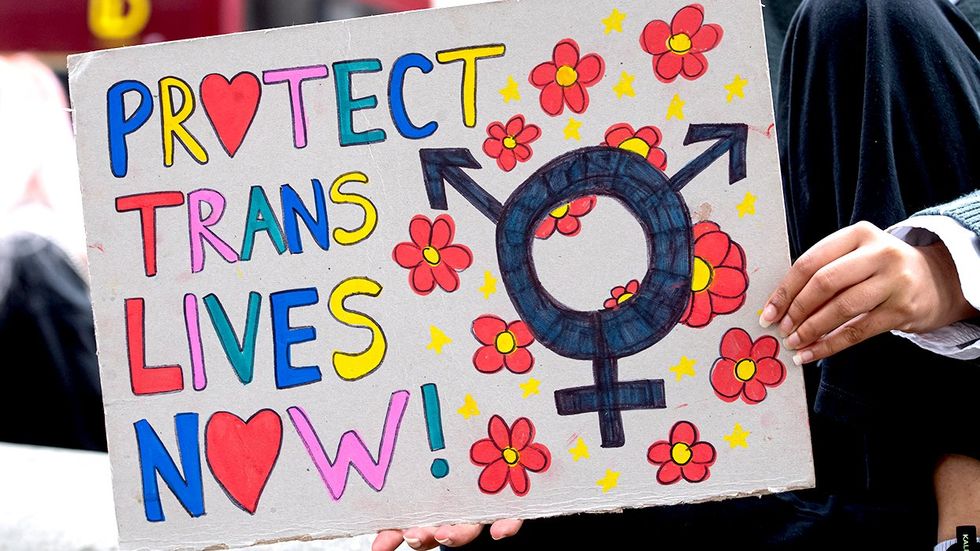In a revealing new report by Everytown for Gun Safety, a disturbing trend has been highlighted, showcasing a rise in homicides of transgender people across the United States, with a troubling concentration in the Southern states.
This comprehensive analysis, running from 2017 through 2023, sheds light on the urgent need for awareness and action against the violence that disproportionately affects the transgender community.
Keep up with the latest in LGBTQ+ news and politics. Sign up for The Advocate's email newsletter.
In an in-depth interview with The Advocate, Sarah Burd-Sharps, senior director of research at Everytown for Gun Safety, shared insights into the findings and the pressing implications of this data. She emphasized the dire connection between firearms and the murders of transgender people amid a challenging landscape where a lot of data wasn’t readily available.
“We started tracking the homicides of transgender and gender-expansive people in 2017 because there was very little understanding of the link between gun violence and violence against the transgender community,” Burd-Sharps said.
The report documents 263 homicides over the seven years, with an alarming increase in incidents, particularly in 2023. With approximately three-quarters of these homicides involving a gun, the report underscores the critical nature of addressing gun violence as a key factor in these tragic deaths. A stark revelation from the study is the disproportionate impact on Black transgender women, who represent a substantial majority of the victims, further magnified by the prevalence of firearm use in these crimes.
Related: Trans People Continue to Be Murdered at Extreme Rates as Republicans Push Transphobic Laws
Burd-Sharps pointed out the correlation between the surge in anti-transgender sentiment, particularly in the South, and the rising instances of violence.
“Nearly half of these incidents involving guns are in the south, in southern states,” she said, explaining that trans people in the South face specific dangers.
She attributed this trend to a combination of lax gun laws and discriminatory legislation. Burd-Sharps drew a direct line between policy decisions and the safety of marginalized communities, suggesting that legislative action — or inaction — has real, tangible consequences for the lives of transgender individuals.
“It’s a combination of weak legislation on hate crimes and the kind of new [anti-LGBTQ+] legislation that state governments are considering and passing that target transgender people for unequal treatment,” Burd-Sharps said.
She called for stronger legislative action across the country, advocating for the enactment of hate crime misdemeanor prohibitors and extreme risk (or red flag) laws as critical steps toward mitigating this violence. Such measures would significantly impact the safety of transgender individuals by restricting access to firearms for those with hate crime convictions and allowing for the temporary removal of guns from individuals posing a threat to themselves or others, she said.
This toxic mix of discriminatory laws and lax gun regulations creates a perilous environment for transgender individuals, particularly in states like Texas, which lacks prohibitions against firearm possession for individuals with hate crime convictions.
“If Texas would adopt a hate crime misdemeanor prohibitor, like half of U.S. states, it would right away make a difference,” Burd-Sharps explained. Such legal measures would prevent individuals convicted of hate crimes from legally owning firearms, a step she views as crucial for reducing violence against transgender people.
Related: Gun violence ‘is always going to sit with me:’ Grief, trauma, and the rising threat of firearms in America
Addressing the broader societal implications, Burd-Sharps urged a collective understanding and response to gun violence, emphasizing that it affects entire communities, not just the transgender population. “Hate crimes and hateful actions in our communities, no matter who it’s against, affects all of us,” she said, calling for a united front to protect vulnerable groups and foster a safer environment for everyone.
The conversation also explored the broader social implications of transgender homicides, with Burd-Sharps emphasizing the role of stigma and discrimination in pushing transgender individuals to the margins of society. This marginalization, she noted, often forces transgender people into vulnerable situations that increase their risk of becoming victims of violence.
“One of the root causes is the challenge to finding employment, the challenge to being discriminated against, pushes you towards occupations that can expose you to more risk and higher rates of crime,” she said.
These social determinants of health and safety, combined with legislative hostility, create a precarious existence for many transgender people.
Burd-Sharps said transgender homicides should matter to everyone, not just those within the LGBTQ+ community. She framed this violence as an issue that impacts entire communities.
“We live in communities, we live in neighborhoods, and I’m not just saying that you could take a bullet because you happen to be in proximity of it, but you are part of a community where these crimes are occurring,” she said.















































































